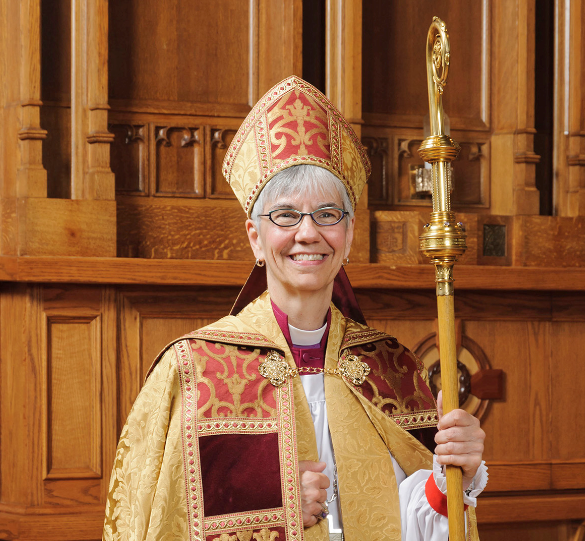At the University of Chicago, the school of divinity and the school of business stand across from each other. Even so, Melissa Skelton may be the only person to earn a master’s from both schools at the same time.
It may seem an odd pairing — Master’s of Divinity and Master’s of Business Administration, Messiah and mammon — but that may have been exactly the mix that led Lower Mainland Anglicans to decide that Skelton was the best candidate to lead the local diocese.
Skelton was installed in March as bishop of the Anglican Diocese of New Westminster, the church division that includes Vancouver and the entire Lower Mainland. Yes, she is the first woman and also the first American.
But gender and birthright don’t nearly tell the whole story. Before being ordained to the priesthood, she was the wife of a priest in the Episcopal church (which is what Anglicans are called in the United States), a mother and a brand manager with Proctor and Gamble, the consumer goods behemoth. She gets marketing, which could logically be an advantage to her challenging new role.
Still, she does not want anyone to conflate her marketing career with her clerical responsibilities.
“It’s not a consumer mentality,” she says of the new role; it’s about relationships and meaningful connections. Suggestions that local Anglicans have hired a CEO are similarly dismissed by Skelton. But she is an organization person and she sees her new role as strengthening the foundations of the church, rather than pursuing grand causes. Which means she will be different from some of her predecessors.
This diocese was at the forefront of the battle over the ordination of female priests. More recently, the Diocese of New Westminster — and Skelton’s predecessor, the just-retired Bishop Michael Ingham — became (in)famous as leaders in the Anglican church’s movement toward blessings for same-sex couples, a controversial debate that split the church.
While Skelton fully backs the stance on same-sex blessings, don’t look for her to be as visible as her immediate predecessor — unless you are an Anglican parishioner.
Skelton’s mission here is to help the 68 parish churches in the diocese revitalize themselves. She was elected, at least in part, because she was familiar to some B.C. Anglicans as the innovative priest who led local training sessions on strengthening congregations. Moreover, she had a record of achievement in revitalizing a downtown Seattle parish.
St. Paul’s Seattle is a parish in Lower Queen Anne (near the Space Needle, for Vancouverites’ GPS). A previous priest had made the gesture that anyone in the city who had died of AIDS would be provided a funeral and burial through St. Paul’s, whether or not they were a member of the congregation. The promise was meaningful and noble, but there was an unintended consequence.
“What the parish experienced was just an endless line of funerals,” says Skelton. “It was the right thing, in a sense, for the parish to do. But it broke their hearts.”
The ceaseless grieving exhausted the parish, but advancements in treatment for people with HIV and AIDS provided some respite. Still, when Skelton arrived as parish priest, in 2005, she admits, the church was “tuckered out.”
“The story of St. Paul’s Seattle was taking its essential identity, polishing it off, saying ‘we can do it’ — and, lo, we did,” Skelton says. It was about getting back to basics. “We tripled in size in nine years,” she says. For a mainline Christian church on the west coast of North America in the 21st century, that’s a triumph. Statistics say Anglicans and similar traditional denominations are heading the other direction.
“Statistics are pretty important to me,” she says, but while some Anglicans look at statistics and see only gloom, Skelton does not. “If I believed that, I wouldn’t have been able to do a darn thing. It really has to do first and foremost with trusting that we have not been abandoned by God.”
Trust in God — and build organizational skills. Most religious leaders graduate from theological school with knowledge but no training in organization or sense of the purpose of a parish church, she says. Under her leadership, local parish churches can expect some extra hand-holding as they struggle to find their way. More training for clergy and laity, as well as funding for new projects, should add some energy to congregations that are struggling to put bums in pews.
She is seen as a bit of a wunderkind for her work at St. Paul’s Seattle, so what’s the silver bullet for struggling Anglican parishes in Vancouver? There isn’t one.
“There is not one answer that is true for all parishes,” she says. “It has to do with the parish’s gifts.”
Is she intimidated by the challenges she faces?
“Depends on the day,” Skelton laughs.



